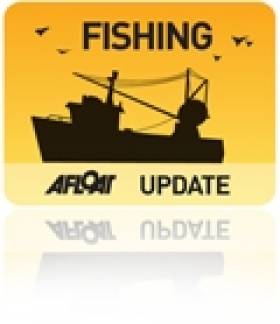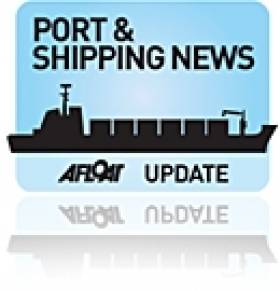Displaying items by tag: Campbeltown
#fishing – A skipper who pleaded guilty to charges including failing to keep a proper look out has been fined more than £5,000.
Malcolm Edmund, who is skipper of the fishing vessel Sapphire Stone was charged following a collision with another fishing vessel Karen causing its loss.
On 22nd January 2014, the fishing vessel Karen was coming to the end of a four hour tow to the south east of the Island of Arran, when she was struck astern by the Sapphire Stone.
Sapphire Stone had just brought its final haul for the day aboard and was bound for Campbeltown for the night.
Skipper of the Karen, John Muir said she went down by the stern so quickly that the crew did not have time to get their lifejackets from the cabin.
The crew managed to launch the life raft but in the choppy seas it overturned and all three found themselves in the water. Mr Muir managed to right the raft and they all got in.
Meanwhile, the Sapphire Stone had managed to get alongside the life raft and recovered all the men safely onboard. She then continued to Campbeltown where they were met by the emergency services.
During an investigation by the Maritime and Coastguard Agency, it transpired that one of the crew employed onboard the Sapphire Stone had not completed the required safety training courses and that Mr Edmund had been issued with an improvement notice the previous September for a similar offence.
Today (8th June), at Newtownards Magistrates Court, Mr Edmund pleaded guilty to three charges - failing to keep a proper lookout, causing the loss of the fishing vessel Karen and breaching the Fishing Vessel Safety Training Regulations.
The judge, his worship Mr Mark Hamill said that the case came down to Mr Edmund not looking where he was going.
He fined him a total of £5,500.
Captain Bill Bennett, Surveyor in Charge of the Belfast Marine Office said: 'This very serious accident caused the loss of a vessel. It could very easily have resulted in loss of life. Skippers are reminded of the need to keep a lookout at all times.'
New Passenger-Only Ferry for Northern Ireland-Scotland Route
Plans to operate the first passenger-only ferry service between Northern Ireland and Scotland are scheduled to start in late May, writes Jehan Ashmore.
Kintyre Express is to operate a Ballycastle-Campbeltown service on Fridays, Saturdays and Sundays between 27 May and 26 September. Three daily return trips are scheduled on the service though the 1200hrs sailing from Campeltown and the corresponding 1400hrs sailing from Ballycastle will only operate on customer demand.
The passage time is scheduled to take approximately 1 hour 30 minutes between County Antrim and the Mull of Kintyre which is a distance of some 50 kilometres / 30-miles. Ticket fares for a single journey are £30 and the return is £55. On the remaining days that the route is not operated on, the boat is available for private charter.
In addition the new venture is to include an on-demand Campbeltown-Troon route running between April and September. This second service, linking Argyll with Ayrshire, will operate on Sundays, Wednesdays and Fridays. The journey time is somewhat shorter with a scheduled time of 1 hour 15 minutes. The on-demand service must be booked in advance with singles fares costing £50 and a return ticket at £80. For further information click www.kintyreexpress.com
Like the recent proposals announced for a passenger-only ferry service across Galway Bay click here, the Kintyre Express operation will also use a fast-ferry in the form of rigid inflatable boats (RIB). The two routes from Campeltown will be served by Redbay Stormforce 11 metre RIBS which have centrally heated fully enclosed cabins for about 10 passengers. The Redbay Boats are built in Cushendall, Co. Antrim, for further information about the type of RIB to be used on the new routes click here.
The Ballycastle-Campbeltown route will be unique in that it will be the sole passenger-only ferry operator serving between the island of Ireland and the UK.
When the second route opens between Campbeltown-Troon, the company will be able to provide their boat service linked in with a train journey to Glasgow which they claim can be completed in less than two hours. Trains between Troon and Glasgow Central Station operate every 30 minutes and with a journey time of approximately 40 minutes.
For those who are car-free and time-free, this most northerly of travel routes is arguably the most scenic way to travel between Northern Ireland and Scotland and will appeal also to the intrepid traveler.
On both ferry services bicycles are carried for free and currently there is a special offer with all ferry tickets that can also be used for a free-day pass on the local Kintyre bus network for up to 24-hours. The bus operator is Craig of Campbeltown which trades as West Coast Motors and which owns Kintyre Express. The bus operator also serves on routes throughout Argyll and the island of Bute.
The next nearest cross-channel operator to the Kintyre Express Ballycastle-Campbeltown service is the car-carrying catamaran fast-ferry seasonal service between Larne and Troon operated by P&O (Irish Sea). The same company operates the year-round conventional car-ferry service on the North Channel between Larne and Cairnryan. Also operating to Loch Ryan is Stena Line which operates both ferry and HSS fast-craft services on the Belfast-Stranraer route.
Over the years there have been several attempts to revive the ferry between Ballycastle and Campeltown following a service that catered for vehicles too. For three summer seasons starting in 1997 the service was operated by the Argyll and Antrim Steam Packet Company, using the Claymore (1978/1,632grt) which could accommodate 500 passengers and 50 vehicles.
In 1996 the vessel was chartered to carry out tender duties for visitors and crew of the aircraft-carrier USS John F. Kennedy (displacement 82,655 tons full load) which was at anchor off Dun Laoghaire Harbour.

























































